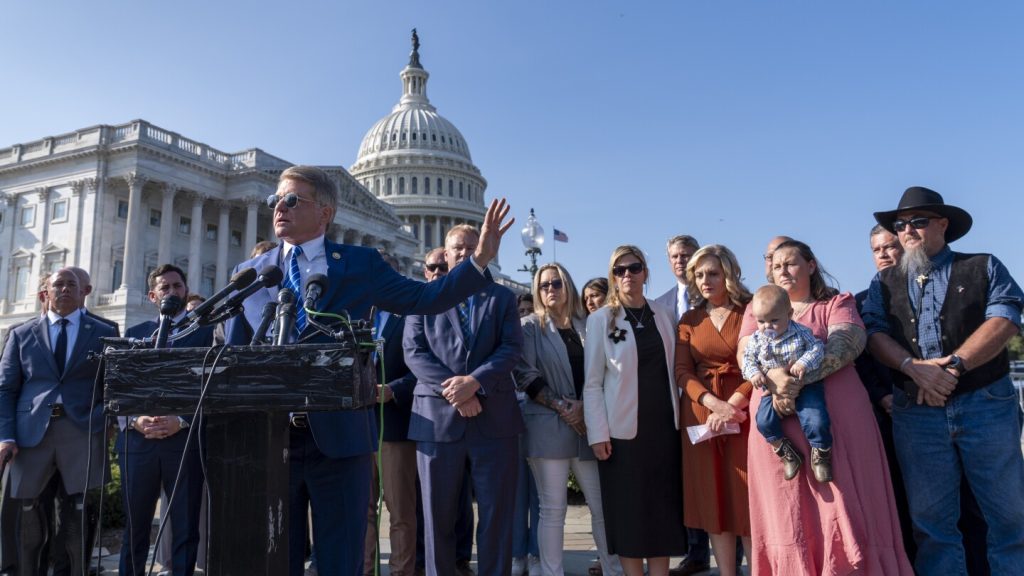House Speaker Mike Johnson awarded the Congressional Gold Medal to 13 U.S. service members who lost their lives in the chaotic withdrawal from Afghanistan in August 2021. Both Democrats and Republicans came together to support the legislation to honor these fallen troops, who were killed in a suicide bombing at the Kabul Airport. The ceremony took place at the Capitol Rotunda, with top leaders from both parties paying tribute to the sacrifices made by the service members. Senate Majority Leader Chuck Schumer emphasized the need to ensure that the sacrifices of all servicemembers were not in vain, calling for continued support for their families and the defense of freedom and democracy.
Despite the somber occasion, the event was overshadowed by political tensions surrounding the blame for the disastrous evacuation from Kabul. House Speaker Mike Johnson, an ally of Republican presidential nominee Donald Trump, criticized the Biden administration for the withdrawal, attributing the lives lost to their decisions. Johnson’s remarks reflected the ongoing back-and-forth between Republicans and Democrats over the handling of the withdrawal, especially in light of the upcoming presidential election. The ceremony became a platform for politicians to express their views on the administration’s actions in Afghanistan, with accusations and calls for accountability dominating the proceedings.
The White House responded to the criticism, dismissing the House Foreign Affairs Committee’s investigation as partisan and inaccurate. White House national security spokesman John Kirby defended the administration’s evacuation efforts, acknowledging that not everything went according to plan but maintaining that the suicide bombing was not preventable. The presence of top military and White House officials at the ceremony underscored the administration’s commitment to honoring the fallen service members and supporting their families. Despite the ongoing debate over the withdrawal, the focus remained on paying respects to those who made the ultimate sacrifice for their country.
Former President Donald Trump has made the withdrawal a central issue in his political campaign, criticizing the Biden administration for the handling of the evacuation. Some Gold Star families have supported Trump’s actions and demanded accountability from leadership during the withdrawal. While Trump and Republicans have sought to link Vice President Kamala Harris to the withdrawal, investigative reviews have not identified any significant impact of Harris on decision-making. House Republicans, however, continue to push for accountability from Harris and Biden’s national security team, framing the withdrawal as a critical issue in the upcoming election.
The blame for the chaotic end to the 20-year war in Afghanistan has been attributed to both Trump and Biden, with assessments pointing to the deal signed by Trump to withdraw forces as a key factor in the Taliban’s resurgence. Biden’s decision to follow through with the withdrawal set in motion by Trump further escalated the situation, leading to the rapid collapse of Afghan security forces and the Taliban takeover. Both administrations have faced criticism for their handling of the withdrawal, with debates over accountability and the implications for future U.S. foreign policy. Despite the political divisions, the focus remains on honoring the lives of the 13 service members who made the ultimate sacrifice in Afghanistan.
The ceremony to award the Congressional Gold Medal to the fallen service members served as a reminder of the human cost of war and the sacrifices made by those in uniform. As the political debate continues, the families of the 13 service members urged the public to remember their loved ones and share their stories. The event highlighted the complexities of U.S. foreign policy and military interventions, underscoring the need for bipartisan cooperation and support for servicemembers and their families. As the nation honors the memory of those lost in Afghanistan, the discussions over accountability and decision-making in the withdrawal are likely to shape future debates on U.S. foreign policy and military engagements.


